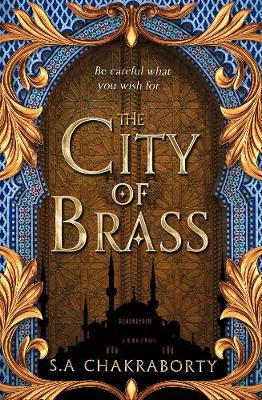Reviewed by Quirky Cat on
I’ll admit, upon finishing this novel I was a bit torn on how to rate it. So I took a few days to make sure the emotions I felt during the final parts weren’t influencing my rating (and to be frank, I think they would have if I had gone with my gut instinct). I have a slight bias against stories that make me feel upset and/or weepy, especially if it’s towards the ending. Which isn’t exactly fair, especially when it’s the first book in a trilogy (and thus has plenty more time to cheer me up and continue the story).
Looking past that, I can honestly say this fantasy was unlike anything I had ever read. Along with the wonderful blend of fantasy and read (the locations described were often real ones, or at least based on real ones), the mix of young adult and adult was the perfect combination to make it approachable to many different audiences.
I really loved the interpretations of the Djinn and Daevas in this story; how their culture was so much more fleshed out (especially when one compares it to a specific famous genie). Everything was just so much more vibrant and alive. I loved every detail mentioned, and would happily have kept absorbing information/details had the author allowed it.
I very quickly took a liking to Nahri’s character. She’s quick, witty, and determined. That’s not all she is of course, it’s hard to summarize a complex character in so few words, but those are her dominant traits for sure. I love how she’s always on her toes, trying to outthink situations or people. Between that and her stubbornness it was hard not to like her. Having her for a main character, and thus main perspective was a brilliant more.
Nahri belongs in Daevabad, of that most of the characters would agree (even if they changed their mind back and forth at times), yet she didn’t come from that world. This gives us the opportunity to learn about Daevabad and its people through Nahri seeing and asking questions. It’s a clever solution to the show and tell problem.
The other characters introduced will absolutely create conflicts – even on the most simple levels (do I/should I like this character?). Two characters in particular stand out; Dara and Ali. Oddly enough, both characters are equally developed, even though Ali is given a perspective in the novel, while Dara is not. That’s not the only move Chakraborty made in contrasting these two characters. They’re night and day, and I mean that almost literally. They have different backgrounds, different beliefs, and different goals. Basically in everything that is major they disagree upon.
After taking a few days to think about this novel, I find myself falling further in love with it. I sincerely hope the second novel in the Daevabad series isn’t too far behind, as I’m very anxious to see what happens to our trio next.
For more reviews, check out Quirky Cat's Fat Stacks
Reading updates
- Started reading
- 10 January, 2018: Finished reading
- 10 January, 2018: Reviewed
